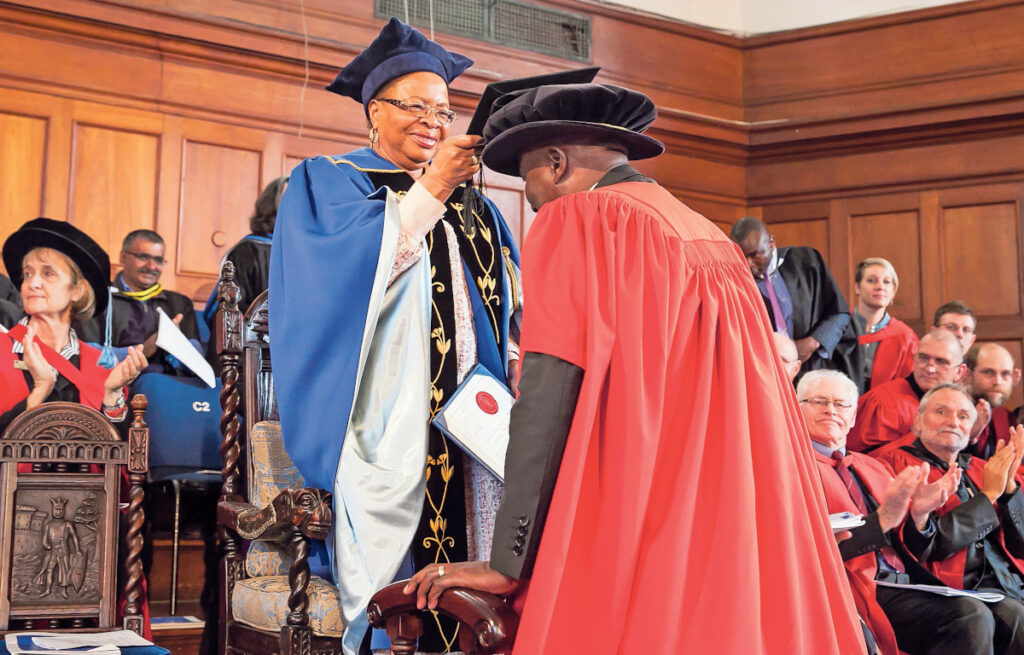As jobs change, so universities are adapting their programmes
A future-focused approach to postgraduate studies
The workplace is changing, and universities need to change too if students are to be primed for real-world success after graduation. With an increased focus on lifelong learning and short courses, this begs the question of whether a postgraduate qualification is still relevant or necessary. Ishmael Mnisi is the spokesperson for the Department of Higher Education and Training, and he says the answer is an unequivocal yes!
“Lifelong learning is not a replacement for a postgraduate qualification, and there would be no generation of knowledge without postgraduate studies,” he explains. “In fact, even short courses would be in danger of extinction without people still pursuing postgraduate qualifications!”
The post-school system provides an array of opportunities, but these opportunities must keep up with national and global economic and employment trends. “These programmes must contribute to developing, thinking citizens who can function effectively, creatively and ethically as part of our democratic society, and participate fully in its political, social and cultural life,” he says.
The Department published lists of occupations in high demand, which should serve as guides for both prospective postgraduate students and institutions of learning: “We have also undertaken research that led to the identification of scarce skills aligned to the country’s Economic Reconstruction and Recovery Plan, and the full list identifies 103 priority occupations.”
He says universities are now introducing more courses in line with the critical skills lists as released by the government, which includes courses in line with the employment needs of the Fourth Industrial Revolution (4IR) and the future of work. “Furthermore, extensive revision and updating of curricula has been undertaken to strengthen and update the digital skills components of those subjects that have technology built into the content.”
Dr Phumeza Kota-Nyati, Dean of Teaching and Learning at Nelson Mandela University (NMU) in the Eastern Cape, says a report published by Dell Technologies and the Institute for the Future states that 85% of the jobs that will exist in 2030 do not yet exist. “Indicators like this inform our university in managing swift academic planning and design processes, and our faculties create programmes informed by the ever-changing global needs and trends,” she explains. “This directs our vision of transdisciplinary programmes that will prepare our graduates with the skills needed to succeed in less traditional workplaces of the future.”
Lifelong learning has also highlighted the importance of short courses and executive education, as offered by many of the country’s business schools. Henley Business School, for example, describes its programmes as “designed to reimagine the classroom as a problem-solving machine”. While practical competencies are important, many training providers are emphasising programmes that include the “soft skills” needed to succeed going forward.
NMU’s Kota-Nyati says new approaches to learning are necessary, but cannot just be replications of past models. “Our philosophy to learning is to empower our students and change the dehumanising legacy left by different social ills.” This is why the university is revitalising humanities and creating multi- and transdisciplinary programmes to enable varied entry points into the world of work. “The practice of co-construction of knowledge with the student, the lecturer and the general public guiding the academic agenda is at the forefront of our vision as an institution,” Kota-Nyati says.
The backbone of future-focused learning, she adds, must be technology: “The digitalisation of our learning is fundamental to the achievement of learning outcomes, especially since the arrival of Covid-19. We have been utilising virtual spaces to create learning experiences and our staff and students are trained to operate these different solutions. At the start of each year we have DigiReady tutors who facilitate training for first-year students, and e-technologists are allocated to each faculty to assist academics.”
She says students have also been provided with data and devices to facilitate and promote learning, and that computer labs are available within residences and other areas in the University for those who cannot access a personal device.
Mnisi agrees that technology is important, adding that the Department is making great strides to ensure that students can access technological learning solutions. “Technology is imperative in the teaching and learning space, but Covid-19 exposed us to many inadequacies and inequities in our education systems, from access to broadband and computers needed for online education, to the supportive environments needed to focus on learning, and the misalignment between resources and needs.”
For this reason, the Department has undertaken a number of interventions to ensure that no student is left behind, and each learner can step into tomorrow with the skills needed for success. – Jamaine Krige
From selling burgers to running her own practice
After completing her undergraduate degree — a BA in psychology and sociology — the only work Lungi Langa was able to find was as a restaurant administrator at a McDonald’s. Completing a postgraduate diploma, however, helped Langa redefine her life and her career. Today, Langa is an HR Group Executive and the owner of Thunalo Pty Ltd, an industrial psychology consulting firm.
 Lungi Langa describes her postgraduate studies as a ‘game changer’
Lungi Langa describes her postgraduate studies as a ‘game changer’
“I had a small office in the restaurant where I did payroll data sheets and personnel record filing,” she remembers. “I was done with my work by 11am every day, and to keep busy for the rest of the day I would go sell burgers with the rest of the staff.” This continued for five years as Langa continued searching for work in her preferred field. “I decided to register for a postgraduate diploma in HR Management and the doors finally started opening for me!” After years of applying, she finally secured her first job as a Human Resource (HR) assistant.
“My BA degree was just too general, and I think this was partly why I could not land my desired job in HR, but after I registered for my postgraduate diploma in that field, everything changed,” she says, adding that this decision curved a clear career path for her. “This postgraduate diploma changed my life in that it was more specific than my undergraduate degree and after many years of trying I was finally able to do the job I wanted, because this was specific to the HR field.”
She says people who want to pursue their postgraduate qualifications should only do so when they are clear about the career path they wish to follow, and should see further studies as a way to specialise in a specific field.
After eventually being promoted to HR manager, Langa was headhunted for a consulting position at a big insurance firm, and she was quickly promoted, climbing the corporate ladder. While working there, she decided to further her studies again, completing first an honours in industrial psychology, and then qualifying as an industrial psychologist after her master’s degree.
She says it is important to decide on a career path and then never give up; work hard and pursue it with passion. “My postgraduate studies were a game changer that just brought more opportunities, and today I own my own industrial psychology practice and consulting firm; it’s a dream come true!” – Jamaine Krige
Recognising experience
Age might just be a number, but when considering a postgraduate qualification, it could also be an advantage. The qualifications you hold, the skills you’ve acquired throughout your life and the real-world experience you bring to the table can (and should!) count in your favour.
 Your life experience may help you gain admission to postgraduate studies (Photo: Gallo Images/Beeld/Deon Raath)
Your life experience may help you gain admission to postgraduate studies (Photo: Gallo Images/Beeld/Deon Raath)
Recognition of prior learning (RPL) refers to formulised evaluations that acknowledge the relevant knowledge and skills that mature learners have gained throughout their lives and careers, by means other than formal education. Universities will assess a candidate’s work and life experience in the context of the learning programme they are being considered for, and these are put towards admission for formal graduate or postgraduate academic studies.
The National Plan for Education prioritises broadening participation of employed workers and mature learners in further study opportunities, and all South African universities have RPL policies in place. Prospective students can contact the university they would like to study through to find out more about the accessibility and admission criteria or how to qualify for entry to a programme through RPL.
NMU’s Centre for Access Assessment and Research has the following advice for postgraduate candidates returning to studies:
Be clear and honest about the reasons for studying. Don’t compare yourself to others and believe in your abilities.
Tell your loved ones why you are studying and how they can support you in your goals. Ask your family and friends to respect your study time, but keep them informed about your progress and activities. Schedule time for social interaction so that you do not lose touch with the people who are important to you.
Manage yourself. Allow yourself enough time to get accustomed to the demands of academic life. Use your time effectively and be organised. Technology is your friend. Use it to your advantage.
Campus support services exist to make academic life easier. Build an on-campus network of friends and acquaintances — this will help you adjust and grow. Reward yourself often, whether for completing a difficult study task, acing a test or coping with the demands of university life. Share your successes with the people closest to you. – Jamaine Krige
Money matters
After deciding to study further, the next big question is usually how to fund a postgraduate qualification. Education is an investment, but not everybody has the financial resources to further their studies. Bursaries and scholarships are one way to foot the education bill.

If you can’t afford postgraduate studies, try applying for the available bursaries
Many opportunities exist for full or partial funding for postgraduate students based on financial need or academic merit. These options include, but are not limited to: the National Student Financial Aid Scheme (NSFAS); university funding; sports bursaries; national funding; research councils; corporate bursaries; donor funding; international funding; employer funding; and private funding, such as a study loan.
Not all funding opportunities are equal though, and bursaries can vary significantly in application criteria and offerings. Some may provide financial assistance with no expectations, while others may expect a commitment to work for them after graduation.
The first step in securing a bursary is to establish what options are available in specific sectors or academic programmes. Big companies or institutions often list funding opportunities on their websites. Lists of scholarships or funding opportunities are also available on most universities’ websites. Candidates should carefully check their eligibility for each option before applying.
It’s not enough to look at the bursary criteria — the application process must also be considered. This can range from a simple online submission to academic essays or interviews with funding committees. Take the application deadline into consideration: when it comes to funding, a missed deadline is a missed opportunity!
Remember that a bursary is a contract between the funder and the student; failing to fulfill the obligations and requirements, or meet the expectations set out in the agreement is considered a breach and could result in penalisation or cancellation.
While academic performance is important, it’s not the only way for candidates to stand out. Many universities also offer funding for students who shine on the sports field. Information about sporting bursaries and the application process are available from the individual universities.
Tips when applying for funding
Start early and throw your net wide. Do not wait until the last minute, and do not limit yourself to a single opportunity.
Become familiar with the funder. Read up about their mission, vision and values. Use the requirements of the bursary programme to align your application.
Submitting an incomplete application is unforgivable, so ensure that all required documents are attached, and have been recently certified.
Include a concise letter of motivation written according to the criteria outlined in the funding requirements. Be confident but honest when it comes to achievements. Look beyond academic performance and include other unique selling points.
Be honest about finances. Dishonesty can result in reputational damage and exclusion from future funding opportunities. Many bursaries require short-listed applicants to submit to financial checks.
Be sure to spell check and proofread before submission. There are online templates available to assist in crafting the perfect application.
Have a backup plan. A rejection letter is not the end of the world. Most opportunities are offered on an annual basis, and candidates can reapply until successful. Also consider other funding options: student loans, financial help from family or friends, or corporate sponsorships. – Jamaine Krige
Why a postgraduate degree is the way to go
Graduating with an undergraduate degree is undeniably an immense accomplishment, considering the sacrifices made by both students and their families. However, the prized undergraduate degree is gradually losing its status as the gold standard qualification for job applicants today.
 In the increasingly competitive job market, having extra qualifications can give you the necessary edge to find that fulfilling employment you’ve always wanted
In the increasingly competitive job market, having extra qualifications can give you the necessary edge to find that fulfilling employment you’ve always wanted
The job market has become increasingly competitive in recent years. The Covid-19 lockdown restrictions and global recession of 2020 have caused an uncertain outlook for the labour market and accelerated the onset of the future of work. “With fewer employment opportunities in South Africa and employers demanding a strong set of skills, new graduates find it increasingly challenging to find employment,” says Dr Priscilla Mensah, Director for Research Development at Nelson Mandela University.
On top of a diminishing job market, the hiring landscape is also changing. Roles that in the past only required primarily undergraduate degrees are advancing and requiring a postgraduate qualification as a minimum. She adds: “More employers are realising that the enhanced capabilities of candidates with postgraduate degrees are translating into positive impacts across the board, which is why they are raising the bar in terms of requirements.”
Graduates are realising the advantage that lifelong learning offers in shaping a successful career in an ever-changing world and are considering pursuing a postgraduate qualification before entering the working world. “With so many qualified graduates jostling for a limited number of positions, having a postgraduate degree under one’s belt can hold the key to securing full-time employment and a better chance of being promoted in the future,” notes Dr Mensah.
Universities are also deeply committed to providing experiential learning opportunities that cultivate innovative, entrepreneurial mindsets and enhance the readiness of graduates for life and work. On the African continent, Nelson Mandela University is at the forefront of research in a range of fields, including ocean science, nanotechnology, women and gender studies, and marine robotics.
Specialist skills and knowledge
New careers are emerging faster than ever as a result of rapidly advancing innovation and technology. Future businesses will require super-skilled, next-generation candidates to fulfil these roles. In a World Economic Forum report, The Future of Jobs, the top skills employers see as rising in prominence by 2025 include critical thinking and analysis, as well as problem-solving and skills in self-management such as active learning, resilience, stress tolerance and flexibility.
These are the very skills postgraduate qualifications aim to cultivate. Dr Mensah adds: “Pursuing a postgraduate degree increases a graduate’s level of specialist knowledge and equips them to become a true expert in their field. Not only does a postgraduate qualification offer a deeper understanding in an area of specialisation, but it also nurtures natural intellectual curiosity and equips graduates with an array of vital sought-after skills that are valued in the workplace.”
Lifelong learning experiences
Continuing to learn throughout one’s life to foster continuous development and skills needed for employment and personal fulfilment is perhaps the approach graduates need to take to be able to excel in an automated world.
Dr Mensah observes: “The majority of students study towards an undergraduate degree primarily to fulfil a minimum requirement for their career field. Choosing to study further on a lifelong learning journey presents an opportunity for graduates to enhance their personal and professional development, empowering them to change the world for the better.”
From honours to doctoral level, Nelson Mandela University offers quality and accredited postgraduate qualifications that enable graduates to build on their success and accelerate their career advancement.
Contact us via email at [email protected] for more information or visit https://www.mandela.ac.za/Study-at-Mandela/Postgraduate-Study
What motivates you?
The Covid-19 pandemic forced many people to reevaluate their present situation and future prospects, both personally and professionally. This according to Zakiyya Essa, counselling psychologist and founder of the Career Counselling Company. For this reason, she says, there has been a sharp increase of clients seeking advice about postgraduate study options.
 Career development is a lifelong process, says counselling psychologist Zakiyya Essa, and the workforce requires people with more diverse skills
Career development is a lifelong process, says counselling psychologist Zakiyya Essa, and the workforce requires people with more diverse skills
Deciding to pursue a postgraduate qualification is a big decision, not only for undergraduate students but also for professionals looking to push their career to new heights. Taking the next step can be terrifying, but help is available for prospective students who may still be unsure if a postgraduate qualification is right for them.
“The pandemic gave people an opportunity to pause in life, take stock and reassess their priorities; some people ‘reinvented’ themselves, while others ‘returned’ to themselves,” says Essa. “It enabled people to consider options for further development, and to step up and be brave in pursuit of their dreams and goals.”
She says career guidance can benefit prospective postgraduate students and mid-career professionals hoping to resume their studies. “It’s helpful to reassess your objectives at any stage of your development and career journey, because career development is a dynamic, lifelong process.”
Margarethe Booysen is a leadership and research coach. She says career counselling is one way for prospective students to access information about their future, but that this is an advice-driven process. “Coaching, on the other hand, is a human development process built around structured and goal-directed conversations in order to facilitate sustainable change to the benefit of the client,” she explains. “The role of the coach is not to provide advice or information, but rather to act as a facilitator of change and assist the client to find their own answers through thought-provoking conversations.”
She says that career counselling and coaching both have a role to play when it comes to making career decisions: “When you feel stuck or have a vague sense of dissatisfaction with your current career, coaching can be useful to help you to explore your feelings and understand what it is about you, your role or your organisation that causes the discomfort. Through coaching you can put together a comprehensive plan that will incorporate the development of different areas of your life and take your past and current circumstances into account.”
When it comes to prospective postgraduate students, Essa says it’s important to take the level of work and life experience of different age groups into consideration. “Young people often feel they lack experience when entering the workforce, even with postgraduate qualifications, but overlook the benefits of having spent the extra time furthering their studies: you get access to the latest information, resources, data and invaluable supervisory support that can give you the edge,” she explains. “With this group we aim to increase work-opportunity awareness and do employability skills training.”
Her work with mid-career adults seeking a career change helps them zoom in on competencies, identify transferable skills and upskill if necessary with a relevant postgraduate qualification. “Many older adults qualify for age exemption to study a higher qualification, and this can help take their careers to the next level.” Essa says many companies will also pay for employees to study part-time or online as part of their professional staff development goals.
Booysen says some clients are motivated by anxiety to make career changes or enrol for postgraduate studies. “Before embarking on a new qualification or career change, it is useful to first explore what is driving the need, which can lead to clearer planning and better decision-making.” Coaching may be useful in helping prospective students reflect on what they really want from their careers and find clarity and motivation to move forward into their desired future.
While the benefits of a postgraduate qualification are clear, there are also numerous challenges, says Essa. “Financial obligations almost always come out as the main consideration when deciding to enrol for postgraduate studies or not,” she explains. “Many undergraduates have loans to pay back or bursaries that don’t cover postgraduate studies, while some work in fast-paced internships or entry-level jobs that don’t leave much time for studies.” Older students might have more family obligations and work responsibilities.
 Margarethe Booysen says that career coaches can help those who wish to further their studies make more informed, clear choices
Margarethe Booysen says that career coaches can help those who wish to further their studies make more informed, clear choices
The journey, she adds, can also be time-consuming, demanding and isolating. But, says Essa, this doesn’t mean that it can’t be done: “It’s all in the planning! Studying requires a commitment from you. Ensure that you have adequate financial support to fulfil your daily obligations and cover your studies. Ask yourself what you want to achieve from your postgraduate qualification, and ask whether you might be better served by a different skills-based programme or short learning course. The workforce requires people with more diverse skills, and single-career options are no longer the norm.”
Students should consider skills-focused and technology-based courses to fill the gaps in the workplace, and always ensure that the qualification they’re pursuing has “real world” application and demand. “Do your homework and make an informed decision: What do you expect from your postgrad programme, what do you expect your qualification to do for you, and are these expectations realistic given the job climate and employment space?”
So when is the right time to start a postgraduate qualification or resume studies? “It is always the right time and it is never the right time!” Booysens laughs, adding that it’s also important to look at the industry you work in. For example, she says, there are very few accountants who proceed to a PhD level, and doing so might not change their future career prospects. A lot depends on the employer — some organisations do not value a postgraduate education, while at other companies it could fast-track your career advancement or open doors to executive levels.
The type of goals a client sets will influence the type of coaching that they seek: “Life coaching is primarily focused on the personal development of the client but could include aspects of professional development. Leadership or business coaching takes the personal domain of the client into account, but the focus is on the professional development of a client within an organisation. A research or academic coach can assist you greatly in becoming reacquainted with academia if studies are resumed after an extended period, as the transition, particularly from honours to master’s, can be challenging.” – Jamaine Krige
Postgraduate advice from counselling psychologist and career consultant Zakiyya Essa:
“You will have high moments, low moments and a tonne of anxiety! Keep an eye on your emotions and be kind and patient with yourself. You will have less time for those around you, so be prepared to miss out on important social or life events. Many people will not entirely understand what it takes to succeed in your postgrad studies. You don’t need negative energy, so remember why you chose to do this and keep your eye on the goalposts. Make sure that you schedule in time for exercise, self-care/spiritual care and seek mental health support from the resources around you (such as campus health and counselling centres). Your classmates will likely be your biggest support as there is a shared experience, so maintain good ties and help each other out where you can.”
Questions to ask yourself before embarking on postgraduate studies from leadership and research coach Margarethe Booysen:
What is your motivation to study further? Are you driven by internal or external factors? How much time will the planned qualification require from you? Would studying full-time be feasible? If not, is the programme offered as a part-time option? What are the financial implications of studying? Would this benefit or harm your financial situation in the long run? Are there study schools to attend, and will you need to travel?
Is a postgraduate qualification the right decision for you, or can you achieve similar results by attending a university-accredited short course? Is the qualification relevant to your current or future career, or simply for personal development? Is your organisation supportive of continuous development? What other support is on offer? Will you get study leave or have to take unpaid leave? Is there financial assistance from your employer or prospective employer, and what do they expect in return?